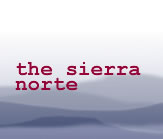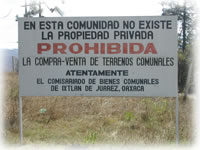 |
 |
||
 |
|||
|
RELATED THEMES identity justice and crime environment politics OTHER LOCAL THEMES BACKGROUND |
conflict
Tiltepec has tense relations with its neighbour, the village of La Luz, a new settlement in the same valley. The long-standing inhabitants of Tiltepec resent the intrusion of people from La Luz into their own land and, as they see it, their reckless exploitation of the forest: ".others, from Atepec - they came here to our forest and they established a village to which they gave the name Santa Maria La Luz.these people enter the forest when they feel like it, to hunt animals and cut down trees." This same narrator suggests that the way to sort out the dispute is by recourse to government institutions: "Well, now there are many government institutions where they have banned hunting and deforestation and we have to talk with these people to be able to split off a certain part of our territory for those from La Luz because it's their fault that we now don't have animals or forest." (Mexico 3). A community representative of Yavesía (Mexico 14), also locked in territorial dispute, tells the story of a gunfight with members of a neighbouring village, severe enough to result in deaths: ".something I'll never forget was when there was the gunfight by the sawmill. Well, we were children, I went with my father. there were some other young people of about 20.and they said: 'Over there, the ranchers are coming, they're going to attack us.' . seeing ourselves surrounded, the last thing that was shouted was 'Get out your shotguns'. The next day the judicial police, the army arrived because there had been notifications of deaths, yes!" Yavesía, Lachatao and Amatlán are pueblos mancomunados, communities sharing land, but Yavesía feels its resources are threatened by the exploitative attitudes of the other two and wishes to formally separate its land and environment. An invasion of their land was successfully resisted in 1998 when the community president called out the men of Yavesía to defend their territorial limits again: "I was proud .we were notified that there would be a remarking. of the boundary line here in Pueblo Viejo, that is our border, it's up to us to do it. Well, the notification arrived at 10 in the night, well, what does one do? .the president announced that everyone must present themselves because the people of Lachatao and Amatlán were invading what was Yavesía's territory. So we prepared ourselves immediately that night." (Mexico 14). Another community, Ixtlán, had also been threatened in years past by neighbouring villages in a group, which included Ixtepeji. Again there was, it seems, resort to firearms, something that is referred to by this narrator with satisfaction: ".other communities were fighting very hard to push out the people of Ixtlán. I'm talking about Ixtepeji, Lachatao, Guelatao and Capulapan. They managed to surround Ixtlán but we got support thanks to intervention from the late Enrique Bernardino who managed to help us, he managed to break the circle and went to get help from Atepec. Well, only 20 people came from there but all were well trained in everything - well, in killing deer - and so they had unfailing aim. With this [help] it was sufficient to defeat and break the circle that enclosed Ixtlán" (Mexico 15). The presence of Protestants in the area is also referred to as a source of conflict within the community of Tiltepec. One woman (Mexico 6) says they are responsible for the decline in traditional culture: ".Yes, some young people listen to the Evangelicals [and] they refuse to cooperate [and take part] in the festivals and cultural events. That religion is causing us to lose a lot of respect [for] customs and traditions. That's why a good festival can't be organised [today]." quotes about conflict"Of course the people from La Luz won't be happy with [action by Tiltepec to prevent incursion] because they won't be able to continue like before, no, because we are indigenous here and owners of our territory, because now we are sad because of what's happening" "So that was a very major experience for me, to see how the community defended itself. The community.has always been very brave. The people are peaceful, the things are done properly, but with things that are done with bad intention, well the village has its ways of acting.There were even times when there were people, now deceased, may they rest in peace, who came to blows in the forest - that shows with what courage they defended things." "Well as I said, there have been many years of dispute with these communities [Amatlán and Lachatao] and not only with words [but now] a legal procedure is also being taken. We have our lawyers.We are ensuring that everything goes to order and I hope that this matter finishes and we can say, with every right, that the forest, flora, fauna and water sources should be respected..." "Before there weren't documents like now; now we [in Tiltepec] have the resolución presidencial (legal recognition of land). What they made [before] was a cloth that they called a 'map' in their language.but in Spanish it's called lienzo (literally, canvas, Lienzo de Tiltepec). This was their documentation, which was very valuable for defending their property and their borders in the forest. Every year the person whose turn it was for the cargo (unpaid community position) of mayordomo (person responsible for arranging community festivals) guarded it." |
|
 All four communities have been involved in conflicts with neighbours. Disputes over territorial boundaries between communities in the Sierra Norte are common. Old settlements were typically established in sparsely populated areas without definition of the extent of community territory. As communities have expanded and looked to secure their rights of access to surrounding forests and lands, they have come up against each others' limits and clashed.
All four communities have been involved in conflicts with neighbours. Disputes over territorial boundaries between communities in the Sierra Norte are common. Old settlements were typically established in sparsely populated areas without definition of the extent of community territory. As communities have expanded and looked to secure their rights of access to surrounding forests and lands, they have come up against each others' limits and clashed.